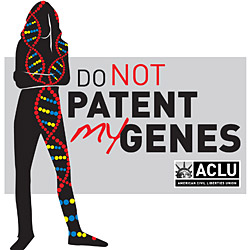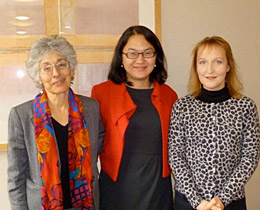
(Editor's note: We know it's no longer Women's History Month, but we still have a lot more to say! We'll be featuring a few more posts in April.)
When people think of women's rights, issues like the glass ceiling, sexual harassment, or reproductive freedom usually come to mind. At the ACLU, we continue to push for women's equality in these areas while also identifying and fighting new threats to civil liberties. The latest? Patents on human genes.
On Monday, the ACLU will be before the Court of Appeals for the Federal Circuit in Washington, D.C., to argue that human genes should not be patented. Arguing with us will be Acting Solicitor General Neal Katyal. That's right: the U.S. government has filed a friend-of-the-court brief concluding that patents on human genes issued by the Patent Office are invalid.
Over the last 20 years, the U.S. Patent Office has granted patents on human genes once they are "isolated," or removed, from the body and cell. BRCA1 and BRCA2, which are associated with hereditary breast and ovarian cancer, are just two of the approximately 20 percent of human genes that have been patented. Women and men who have certain mutations on these genes are much more likely to experience cancer in their lifetimes. For that reason, physicians and genetic counselors recommend genetic testing for some patients with a significant family or personal history of breast or ovarian cancers, so that they can more fully understand their risk of developing future cancers and to help inform medical decisions.
However, because a company called Myriad Genetics controls the patents on the BRCA1 and BRCA2 genes, there is only one laboratory in the United States that provides BRCA sequencing — Myriad's.
We filed a lawsuit challenging these patents on behalf of pathologists, geneticists, women's health organizations and patients. We argued that the patents are invalid because they cover natural phenomena, which the Supreme Court long has shielded from patenting. The federal district court agreed, in a landmark ruling that concluded, for the first time, that genes are not patentable subject matter because they are products of nature. Myriad has appealed.
As an ACLU attorney, I never expected to immerse myself in patent law. But the stakes are high for patients, scientific freedom, and the future of medicine. Because the patentholder has the exclusive right to examine and test a gene, gene patents essentially grant a monopoly over an entire area of scientific inquiry, including into cancers that affect far too many women. At a recent event organized by the Harvard Women's Law Association, two of the plaintiffs in the lawsuit spoke eloquently about how these patents affect women's and patients' rights.

ACLU clients Judy Norsigian (left) Lisbeth Ceriani (right) and Sandra Park at a the Harvard Law School event on March 9.
One of the plaintiffs in our lawsuit, Lisbeth Ceriani, shared her struggle to get tested. After she was diagnosed with cancer in both breasts, she was advised to get BRCA testing to help determine her risk for ovarian cancer. Her insurance company would cover the test if it was done through a contracted provider, but Myriad had refused to enter into a contract. Because Lisbeth could not afford to pay more than $3,000 out of pocket, and because the patents prevent others — like our clients Dr. Wendy Chung and Dr. Harry Ostrer — from offering testing to patients, she had been blocked from obtaining this important information about her own genes.
Judy Norsigian talked about other concerns shared by plaintiffs Boston Women's Health Book Collective (publisher of Our Bodies, Ourselves) and Breast Cancer Action. Both are concerned that patients cannot get a second opinion on their test results, an option that is integral to the medical standard of care. Furthermore, Myriad's refusal to share the data it has collected on BRCA1 and 2 mutations raises serious questions about whether it is undermining research and scientific progress.
These concerns have led several cancer and women's health organizations to support our case, including Facing Our Risk of Cancer Empowered, the Ovarian Cancer National Alliance, and the National Women's Health Network.
The American Medical Association, March of Dimes, AARP, and Nobel Prize-winning economist Joseph Stiglitz also have spoken out because they recognize that patents on genes create barriers to medical care and the development of true inventions, such as new tests and therapies.
In its friend-of-the-court brief rejecting the Patent Office's policy, the government stated that a gene that has simply been removed from the rest of the cell is not patentable:
"The chemical structure of native human genes is a product of nature, and it is no less a product of nature when that structure is 'isolated' from its natural environment than are cotton fibers that have been separated from cotton seeds or coal that has been extracted from the earth."
So we'll be back in court Monday, where the appeals court will hear oral arguments in the case. To learn more about what you can do, click here.
We're holding a month-long blog symposium on women's rights for Women's History Month. See all the blog posts here, and learn more about women's rights: Subscribe to our newsletter, follow us on Twitter, and like us on Facebook.



